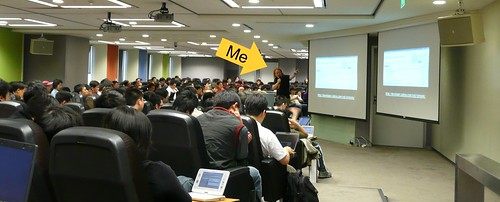De-trolling the web: don’t post in anger
Monday, June 4th, 2012At the fluent conference last week Nicole Sullivan gave an interesting keynote called Don’t feed the trolls:
I liked this very much. We need to fight the current culture of animosity, one-upping and “winning” on the web and turn it towards a culture of nurturing each other and that values communication and agreement instead. The main techniques to do that were outlined by Nicole:
- Understand your own prejudices and communication failures
- Respond to what makes sense and is the human part in troll mails and posts
- Don’t feed trolls – don’t fall for baits
Nicole works through a few kinds of trolls, jealous trolls, the grammar nazi, the biased troll (and the trolls who look for bias where there is none) and the scary troll. She alludes to another, which I will cover here:
The accidental troll
In her talk, Nicole defines a troll:
Def. Troll – people who seek conflict
Now, I have been called a troll a few times, and it hurts me every single time. I am not a person to seek conflict – at all. I am very uncompetitive and the best way to bore me is to tell me that $x does things better than me. Good for $x. I am not $x – I can look at what $x is doing and see what I like for myself but I shouldn’t copy it as it is not me. I want to be better myself tomorrow than I am today as I am the person that is with me all the time. If you don’t compare yourself to yourself and get better you play catchup and become the “good” that is somebody else. You have your own, unique way of learning and communicating and you should hone and celebrate that. If you get home and the door closes and you are someone else then there is a problem. This is for actors and rockstars who tend to die in drug overdoses.
So how come people saw me as a troll or gave me the “Don’t be hatin” message that pretty much insults the grammar fan in me? Because I posted in anger. I was pissed off – somebody was wrong on the internet and people even applauded and quoted it. This will not do.
Cultural differences
Part of this is cultural. Europeans, especially Germans, are a direct bunch. We say it like it is. If we want something, we request it. If we don’t like something, we make it obvious without a doubt that this is the case. America, on the other hand is not like that. Everything is about not offending people – not because this is bad, but mostly because you can get sued if you do. How this works in a society that is highly competitive at the same time continuously baffles me. There can’t be any losers in any competition, just third, fourth and forty-eighth winners. This dilutes the idea of competition to the degree that people don’t take them serious any more. In Europe, not so much. A competition is something serious and to win, someone has to lose. The same applies to conversations. Meetings in the US are considered a success if everything was mentioned and nobody was affronted or feels bad coming out of them.
In Europe, the result of a meeting is what has been done and what needs to be done next by who and by which date. If that means someone got blamed for doing things wrong, that is just how it is.
Pointing out an error is not attacking the person who made that error. What it is is pointing out an opportunity to fix something. This is the end goal. A lot of people have problems admitting to failure. To me, a failure is a great opportunity to analyse what happened and making sure you don’t do it again. If that hurts, even better, as it is easier to remember for you not to do it.
With this background it is easy to affront people on mailing lists and other communication devices that lack human communication (body language, voice and so on). The problem is exacerbated when the thing that – in your book – is obviously wrong gets sold as a “best practice” and gets a jazzy marketing-ish abbreviation and people quote it all over the place. Something you consider a mistake becomes something other people strive for rather than being something to learn from by avoiding it.
Countermeasures
So here is what I do now. I channel the Fennec:
You notice that this animal is much more ear than mouth and this is what we should be doing. Instead of firing up a massive post ranting about what is wrong in a certain publication or person we should start asking questions and most of all listening. The same applies to humans: we have two ears but one mouth – let this be our ratio for learning.
So if you disagree with something and it really rails you, give it some time before you answer. Do other things, have fun with people. Then go back and write your post if you still want to. Even better, ask the right questions.
By asking for refinement and pointing out shortcomings of a solution in the form of a question you do not only bring it upon you to do better than the original solution. You also turn your anger into a chance to get the original maker to take on your refinements and make the product that angered you work better. If the original author can not answer your questions you managed to show that they made mistakes and called something a best practice prematurely. And other people listen, too. Which means that they’ll request more details and changes.
Another way of listening is to read all the other posts and comments following the thing that annoyed you. You’ll find that in a lot of cases other people will point out the flaws you see, too and you can join a conversation and maybe even soften the tone of other comments to turn them from flame to request.
All in all a lot of accidental trolling happens because we get the wrong urge to answer as fast as possible and be the first to point out a flaw and thus winning 245 internets. Letting things sink in first and listen for a while helps you write better responses, realise that some sins are not really that much of an issue and make you understand the context of what something was published in, which can be a large part of the content decisions.

